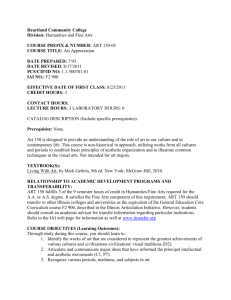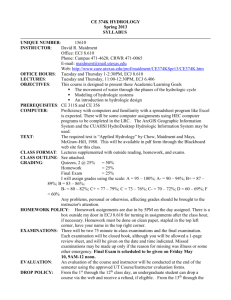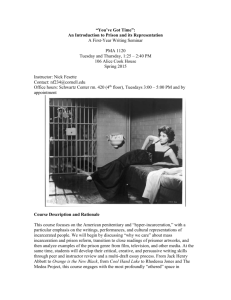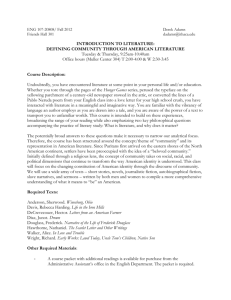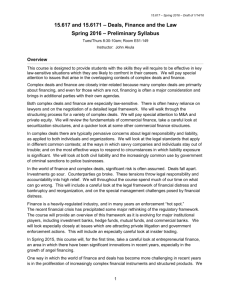Syllabus.
advertisement
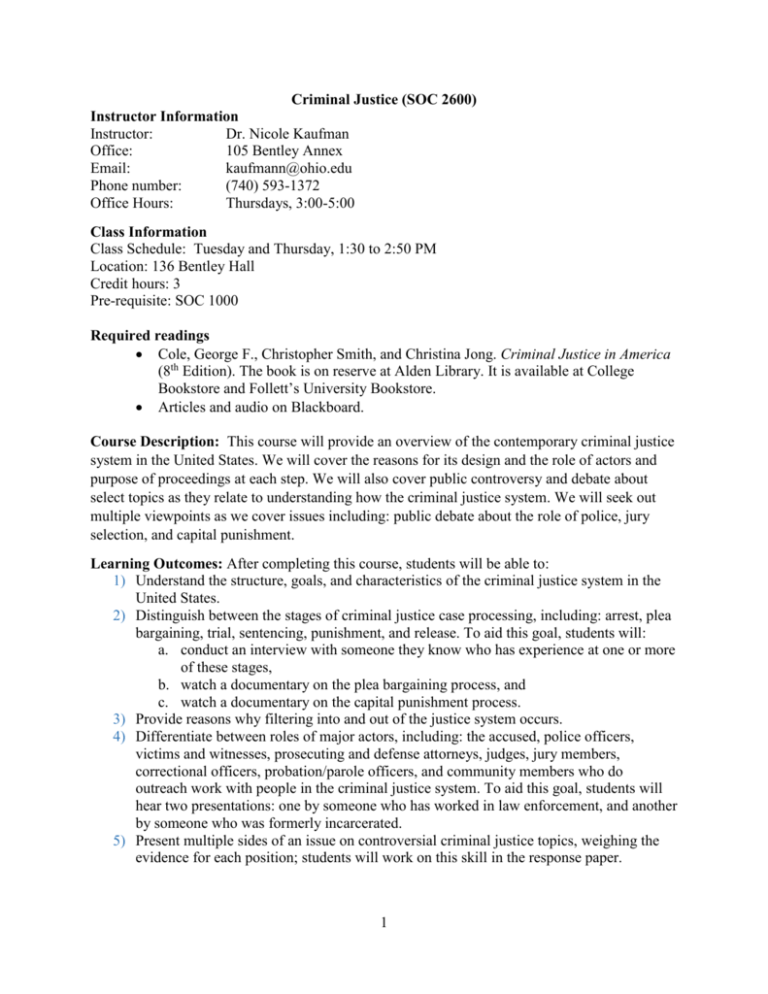
Criminal Justice (SOC 2600) Instructor Information Instructor: Dr. Nicole Kaufman Office: 105 Bentley Annex Email: kaufmann@ohio.edu Phone number: (740) 593-1372 Office Hours: Thursdays, 3:00-5:00 Class Information Class Schedule: Tuesday and Thursday, 1:30 to 2:50 PM Location: 136 Bentley Hall Credit hours: 3 Pre-requisite: SOC 1000 Required readings Cole, George F., Christopher Smith, and Christina Jong. Criminal Justice in America (8th Edition). The book is on reserve at Alden Library. It is available at College Bookstore and Follett’s University Bookstore. Articles and audio on Blackboard. Course Description: This course will provide an overview of the contemporary criminal justice system in the United States. We will cover the reasons for its design and the role of actors and purpose of proceedings at each step. We will also cover public controversy and debate about select topics as they relate to understanding how the criminal justice system. We will seek out multiple viewpoints as we cover issues including: public debate about the role of police, jury selection, and capital punishment. Learning Outcomes: After completing this course, students will be able to: 1) Understand the structure, goals, and characteristics of the criminal justice system in the United States. 2) Distinguish between the stages of criminal justice case processing, including: arrest, plea bargaining, trial, sentencing, punishment, and release. To aid this goal, students will: a. conduct an interview with someone they know who has experience at one or more of these stages, b. watch a documentary on the plea bargaining process, and c. watch a documentary on the capital punishment process. 3) Provide reasons why filtering into and out of the justice system occurs. 4) Differentiate between roles of major actors, including: the accused, police officers, victims and witnesses, prosecuting and defense attorneys, judges, jury members, correctional officers, probation/parole officers, and community members who do outreach work with people in the criminal justice system. To aid this goal, students will hear two presentations: one by someone who has worked in law enforcement, and another by someone who was formerly incarcerated. 5) Present multiple sides of an issue on controversial criminal justice topics, weighing the evidence for each position; students will work on this skill in the response paper. 1 Course Requirements The breakdown of the grade will be exams (40%), quizzes (20%), writing (20%), and exercises (20): Item In-Class Quizzes Criminal Law Exercise Interview Write-Up Police and Constitutional Law Exercise Exam #1 Courtroom Exercise Capital Punishment Exercise Exam #2 Response Paper Portion of final grade 20% 5% 10% 5% 20% 5% 5% 20% 10% Due date Ongoing Thurs., Feb. 5 Thurs., Feb. 12 Tues., March 10 Tues., March 10 Thurs., March 26 Tues., April 14 Tues., April 28 Tues., April 28 In-Class Quizzes: these assessments of your understanding of ideas from reading and lecture will occur each class period. Exercises: These will be worksheets designed to assess your comprehension of a few important class topics. Exams: The exams will be based on comprehension of and critical thinking about the key ideas presented both in readings and in class. I am looking at whether you understand crucial concepts, especially those I will put on the term sheets you will receive leading up to each exam. The exams will consist of multiple-choice questions. One page (two-sided) of written notes will be allowed at the exams. The final exam (Exam #2) is not cumulative. Communicating with the Instructor: I will send out announcements routinely over email, and hold you responsible for the information in those announcements. I encourage you to visit me and introduce yourself by coming to my office hours. If you wish to speak to me but cannot make the office hours, let me know so we can set up an appointment at an alternate time. In emails, please reference the class number (3600) or name (Criminology). Responsibilities and Policies Student Responsibilities: Students are expected to be familiar with Ohio University policies and procedures. (See the Code of Conduct here: http://www.ohio.edu/communitystandards/). If a situation arises that prevents the successful completion of this course, please note that it is each student's responsibility to formally withdraw from this course. Accessibility: Any student who suspects s/he may need an accommodation based on the impact of a disability should contact the class instructor privately to discuss the student’s specific needs and provide written documentation from the Office of Student Accessibility Services. If the student is not yet registered as a student with a disability, s/he should contact the Office of Student Accessibility Services in Baker at (740) 593-2620. It is best to request these accommodations at the beginning so there is ample time to make the accommodations. 2 Academic Integrity: Academic integrity an expectation in all OU classes and applies in this class. Put simply, passing off another person’s work or ideas as your own will not be permitted. The Ohio University Student Code of Conduct prohibits all forms of academic dishonesty, including cheating, plagiarism, forgery, collusion, and furnishing false information to the university. Students who fail to observe these standards are subject to disciplinary action: I will reduce the grade of the assignment and report the incident to the student’s advisor and the Office of Community Standards and Student Responsibility. Students may appeal academic sanctions through the grade appeal process. Attendance: Regular attendance is expected. Attendance is essential for doing well in integrating the information in this course and for our discussions. The quizzes, which reflect attendance and comprehension of reading and lectures, make up 20 percent of the total grade. Students who miss class should seek notes and materials from peers. In the event of an excused absence for an emergency, documented medical condition or illness, authorized university activity, or military service/training, please notify the instructor about your absence. When the reason for the absence is documented (such as note from student health services), the student and instructor can work together to accommodate the absence. Sensitivity: Many of the topics we will discuss will be sensitive. The goal is for our classroom to be safe for everyone. Our discussions require an environment of mutual respect. Differences in experiences make the classroom rich. There may be times when you hear opinions that you do not agree with, in the service of discussing complicated social issues. However, please notify me (the instructor) if you feel uncomfortable with the way we are going about discussions or addressing the course content. Learner Responsibilities: As a student in this class, I expect you to: Take responsibility for your own learning Arrive in class prepared by having done the reading and being ready to take notes, reflect aloud, and ask questions. Treat others with tolerance and respect Set high standards for your work Check your OU student e-mail account every day Keep electronic copies of all your assignments Turn in written assignments both in hard copy and on Safe Assign via Blackboard. Instructor Responsibilities: As your instructor, I commit to communicating openly and frequently with you about this class. I will maintain a professional, safe learning environment adhering to the policies of the college. You can expect a reply to communication, be it via e-mail, voicemail, or in person, within 24-48 business hours. It is my policy not to distribute power point slides from lecture. Please ask after class if you missed something. 3 Syllabus Changes: As your instructor, I retain the right to make changes based on the timeline of the class, feedback from learners, or logistical issues. I will inform you as soon as a change is made. Use of Electronic Devices: In order to minimize distractions to students and the instructor, there is a no computer and no device rule in this class. (There is a possible exception for students who have accommodations and receive special permission.) Computing: Staying up to date on emails and the content of the Blackboard site are essential parts of this course. Computer difficulties are not a long-term excuse for non-participation. If you experience problems with your computer, call the computer help desk through Ohio IT at (740) 593-1222. They can talk you through fixing many problems. A Blackboard course site has been created for this class. You can access this course by logging in to blackboard.ohio.edu. This will be the place to follow your grade for the class. Papers will also get turned in here via Safe Assign. If you have problems accessing our course on Blackboard, please let me know. It is possible that Blackboard may have outages or temporary failures. Grading Policy Appealing a grade: Please take 24 hours before speaking to me about a graded assignment or exam score. Late Assignments: Papers are due at the beginning of class in paper form and on Safe Assign via Blackboard. Work is considered late when it does not meet these specifications. For every day late, I will deduct 10% of the possible points for that assignment. Exceptions can be granted in the case of a documented emergency. Final grades: The final grade for the semester is not negotiable, except in the case of a calculation error. 4 Calendar Class Date Tues., Jan 13 Thurs., Jan. 15 Thurs., Jan. 22 Lecture Topic Introduction CJ System Goals and Characteristics The Flow of Decision-Making in the CJ System Substantive Criminal Law (1) Tues., Jan. 27 Substantive Criminal Law (2) Thurs., Jan. 29 Procedural Criminal Law (1) Pp. 78-85 (until “Defenses against criminal charges”) in Chapter 3 Pp. 85 (starting with “Defenses against criminal charges”)-92 in Chapter 3 Pp. 93-97 in Chapter 3 Tues., Feb. 3 Procedural Criminal Law (2) Pp. 98-104 in Chapter 3 Thurs., Feb. 5 Police: Structure and Organization Police and the Community Pp. 110-136 in Chapter 4 Criminal Law Exercise Due “Police Response, pp. 155-156 in Chapter 5 “Policing in a Multi-Cultural Society,” pp. 167-170 in Chapter 5 Interview Write-up Due Tues., Jan. 20 Tues., Feb. 10 Assignment Due Pp. 5-20 in Chapter 1 Pp. 21-35 in Chapter 1 Thurs., Feb. 12 Tues., Feb. 17 Thurs., Feb. 19 Tues., Feb 24 Thurs., Feb. 26 Tues., March 10 Thurs., March 12 Tues., March 17 Thurs., March 19 Careers in Law Enforcement: Guest Speaker Police Abuse of Power Pp. 149-154 (middle) in Chapter 5 Adams, Eric L. 2014. “We Must Stop Police Abuse of Black Men” (opinion). New York Times, December 4. Pp. 188-192 In Chapter 6 Police and Constitutional Law (1) Police and Constitutional Law Pp. 193-203 in Chapter 6, “Police and (2) Law” Police and Constitutional Law Pp. 204-213 In Chapter 6, “Police and (3) Law” February 28-March 7: Spring Break Exam #1 Police and Constitutional Law Exercise Due The Courtroom Working Pp. 218-248 in Chapter 7, “Courts and Group (Judges, Prosecutors, Adjudication” Defense Attorneys) Bail and Pretrial Detention; Pp. 253-265 (top) in Chapter 8 Plea Bargaining Plea Bargaining: “The Plea” Pp. 265-269 (middle) in Chapter 8 documentary (Frontline) 5 Tues., March 24 Trial and Appeal Pp. 288-298 in Chapter 9 Pp. 308-315 (bottom) Thurs., April 2 Capital Punishment: Documentary selection Goals and Forms of Punishments; Sentencing Process Capital Punishment Pp. 269 (middle)-282 in Chapter 8 2015. Silverglate, Harvey. “Why the Tsarnaev Trial Should Be Moved, Delayed.” Boston Globe, January 2. Green, Emily. 2014. “Finding A Jury Of Your Peers Actually Is Pretty Complicated.” National Public Radio (link on Blackboard), December 27. Courtroom Exercise Due Pp. 299-307 in Chapter 9 Tues., April 7 Corrections System Overview Thurs., April 9 Correctional Officers; Prisoners Community Corrections (emphasis on Probation) Guest Speaker: Prisoner Reentry Prisoner Reentry and Parole Wrongful Conviction, Exoneration, and Clemency; Conclusion Thurs., March 26 Tues., March 31 Tues., April 14 Thurs., April 16 Tues., April 21 Thurs., April 23 (last class meeting) Pp. 330 (from “Organization of Corrections in the United States”)-348 in Chapter 10 Pp. 401-421 in Chapter 12 Pp. 401- 421 Chapter 11 Capital Punishment Exercise Due Pp. 426-445 in Chapter 13 Childress, Sarah. “DOJ Offers New Clemency Program for Drug Offenders.” Frontline, April 23, 2014. Clifford, Stephanie. 2015. “Wrongly Convicted Man Was His Own Best Advocate.” New York Times, January 9. Response Paper Due Tuesday, April 28, at 12:20 p.m. Exam #2 6


